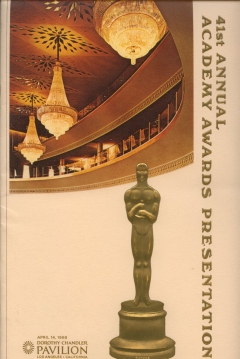Related Research Articles

The Academy Awards, better known as the Oscars, are awards for artistic and technical merit for the American film industry. The awards are regarded by many as the most prestigious, significant awards in the entertainment industry in the United States. Given annually by the Academy of Motion Picture Arts and Sciences (AMPAS), the awards are a recognition of excellence in cinematic achievements of primarily American films, as assessed by the Academy's voting membership. The various category winners are awarded a copy of a golden statuette as a trophy, officially called the "Academy Award of Merit," although more commonly referred to by its nickname, the "Oscar." The statuette, depicting a knight rendered in the Art Deco style, was originally sculpted by Los Angeles artist George Stanley from a design sketch by art director Cedric Gibbons.
The Academy Award for Best Animated Feature is given each year for animated films. An animated feature is defined by the Academy as a film with a running time of more than 40 minutes in which characters' performances are created using a frame-by-frame technique, a significant number of the major characters are animated, and animation figures in no less than 75 percent of the running time. The Academy Award for Best Animated Feature was first awarded in 2002 for films released in 2001.
The Academy Award for Best Animated Short Film is an award given by the Academy of Motion Picture Arts and Sciences (AMPAS) as part of the annual Academy Awards, or Oscars, since the 5th Academy Awards, covering the year 1931–32, to the present.
The Academy Award for Best Documentary Feature Film is an award for documentary films. In 1941, the first awards for feature-length documentaries were bestowed as Special Awards to Kukan and Target for Tonight. They have since been bestowed competitively each year, with the exception of 1946. Copies of every winning film are held by the Academy Film Archive.

The National Film Board of Canada is Canada's public film and digital media producer and distributor. An agency of the Government of Canada, the NFB produces and distributes documentary films, animation, web documentaries, and alternative dramas. In total, the NFB has produced over 13,000 productions since its inception, which have won over 5,000 awards. The NFB reports to the Parliament of Canada through the Minister of Canadian Heritage. It has bilingual production programs and branches in English and French, including multicultural-related documentaries.

The Australian Academy of Cinema and Television Arts Awards, known as the AACTA Awards, are presented annually by the Australian Academy of Cinema and Television Arts (AACTA). The awards recognise excellence in the film and television industry, both locally and internationally, including the producers, directors, actors, writers, and cinematographers. It is the most prestigious awards ceremony for the Australian film and television industry. They are generally considered to be the Australian counterpart of the Academy Awards for the U.S. and the BAFTA Awards for the U.K.

The 42nd Academy Awards were presented April 7, 1970, at the Dorothy Chandler Pavilion in Los Angeles, California. For the second year in a row, there was no official host. This was the first Academy Awards ceremony to be broadcast via satellite to an international audience, though outside North America, Mexico and Brazil were the only countries to broadcast the event live.

The 41st Academy Awards were presented on April 14, 1969, to honor the films of 1968. They were the first Oscars to be staged at the Dorothy Chandler Pavilion, Los Angeles, and the first with no host since the 11th Academy Awards.
Naked Yoga is a short documentary released in 1974 and illustrates the practice of yoga in a natural setting and in the nude. The film includes images of women practicing yoga in Cyprus and in a studio. These visuals are interspersed with images of Eastern art and psychedelic effects. The narrator also relates the practice to Buddhist philosophy. It was shown on television in the UK, however it has not been released to video.
Battle for Life is a nature documentary series made from 1932 until 1934 by Horace Woodard and Stacy Woodard, The short films include the 1935 Oscar award-winning City of Wax, about honey bees. The one-reel short films were released by Educational Pictures. A homemade camera setup for closeups was used. The Woodards followed the series with another series titled Struggle to Live.

Water Birds is a 1952 American short documentary film directed by Ben Sharpsteen. In 1953, it won an Oscar for Best Short Subject (Two-Reel) at the 25th Academy Awards. The film was produced by Walt Disney as part of the True-Life Adventures series of nature documentaries. It was shot in Technicolor by more than a dozen cameramen and was created in cooperation with the National Audubon Society and the Denver Museum of Natural History.
The Alaskan Eskimo is a 1953 American short documentary film produced by Walt Disney. It was the initial film in Disney's People & Places series. In 1954, it won an Oscar for Documentary Short Subject at the 26th Academy Awards.
The Redwoods is a 1967 American short documentary film produced by Trevor Greenwood and Mark Jonathan Harris. It was produced for the Sierra Club as part of their campaign for a national park to protect the redwood forest. In 1968, it won an Oscar at the 40th Academy Awards for Documentary Short Subject.
The Wild and the Brave, also known as Two Men of Karamoja, is a 1974 American documentary film directed by Eugene S. Jones. The film portrays the relationship between Iain Ross, the outgoing British Chief Warden of Kidepo Valley National Park, and his Ugandan replacement Paul Ssali. It portrays the racial and cultural tensions and amity of the postcolonial handover from 1970 to 1972.
City Out of Wilderness is a 1974 American short documentary film produced by Francis Thompson. It was nominated for an Academy Award for Best Documentary Short Subject. Produced by the United States Capitol Historical Society, City Out of Wilderness chronicles the history and evolution of Washington, D.C., from its very beginnings to the then-modern era of the 1970s.
Exploratorium is a 1974 American short documentary film about the Exploratorium science museum in San Francisco, produced by Jon Boorstin. The film explores the museum through imagery and sound, without voice-over. It was nominated for an Academy Award for Best Documentary Short Subject. The film was preserved by the Academy Film Archive in 2013.
John Muir's High Sierra is a 1974 American short documentary film directed by Dewitt Jones produced by Dewitt Jones and Lesley Foster. It was nominated for an Oscar for Best Documentary Short Subject.
Probes in Space is a 1975 American short documentary film produced by George Casey. It was nominated for an Academy Award for Best Documentary Short.
Anna Udvardy was a Hungarian film producer and production manager. Best known for her work on Sing as producer, which earned her critical appraisal and recognition including an Academy Award for Best Live Action Short Film at the 89th Academy Awards in 2017. Udvardy died on 23 May 2019, at the age of 69.
References
- ↑ "Don't". 2012 Environmental Film Festival in the Nation's Capital. Archived from the original on March 17, 2011. Retrieved March 7, 2012.
- ↑ "Don't". Movies & TV Dept. The New York Times . 2011. Archived from the original on May 20, 2011. Retrieved May 27, 2008.
- ↑ "The 47th Academy Awards (1975) Nominees and Winners". oscars.org. Retrieved June 10, 2019.